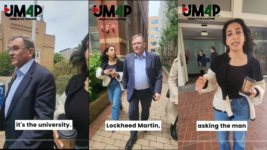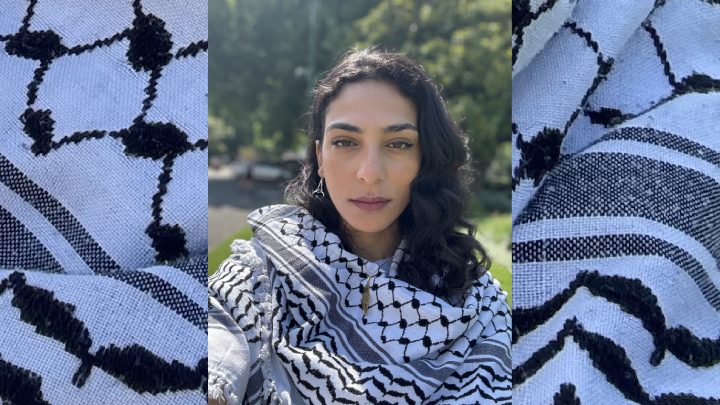“A Sense of Complicity in Genocide”: UniMelb for Palestine’s Dana Alshaer on the Lockheed Martin Partnership

“Why does our university have a partnership with a weapons manufacturer in the first place?” UniMelb for Palestine organising member Dana Alshaer asked Melbourne University vice chancellor Duncan Maskell, which was a recorded confrontation that has since gone viral across social media.
The postgraduate international relations student then names the company which the university has a $13 million research partnership with, Lockheed Martin, which is “literally supplying weapons for an active genocide right now”.
“I’m not going to talk to you about that,” replied Maskell. And Alshaer, a Palestinian international student who grew up on the West Bank, pressed the VC for more, as she asserted, that he has a responsibility to be accountable to students.
Yet, the uni head then said defensively, “You can’t tell me what to do, I don’t think.” And Alshaer reasserted that it is part of his role to answer students, which he denied.
The 27 November confrontation took just minutes. The footage was consumed by thousands across the planet, and Dana puts this down to masses of people asking their own questions about similar associations with Israeli entities that might make them indirectly complicit in genocide.
“Not in our name”
Melbourne University announced it was entering into a collaboration with Lockheed Martin in August 2016, when the US arms company invested an initial $13 million into a research centre, which marked the first time the company has opened such an operation outside of America.
Israel purchased a third squadron of F-35 stealth fighter jets from Lockheed Martin with a price tag of $3 billion in July. These are being used to bomb Gaza right now. And Melbourne company Rosebank Engineering (RUAG Australia) makes the weapons bay door locks for these fighters.
“Why do we have a partnership with a manufacturing company that is literally supplying the genocide… that is killing my people – my children,” Alshaer further asked Maskell. “More than 7,000 children have been killed.”
The Palestinian activist confronted the VC until he entered a building, at which point she demanded a meeting. And following his departure into an elevator, Alshaer condemned his response as revealing a lack of care, which she considers is in line with the institution’s Eurocentric outlook.
“Blood on our degrees”
UniMelb for Palestine has formed in response to the ongoing Israeli-perpetrated genocide in Gaza. It’s made up of “students, staff, and alumni who have a lived experience of colonisation and systemic racism, including Palestinian, Aboriginal, Muslim, African, Asian and SWANA organisers.
The organisation sent an open letter to vice chancellor Maskell, which contained 2,500 signatures calling for the university to end its relationship with Lockheed Martin, yet it remains unanswered.
While an email Maskell wrote to the students addressing the horrors in Gaza has been deemed “dehumanising” and inappropriate.
Sydney Criminal Lawyers spoke to UniMelb for Palestine organising member Dana Alshaer about what her group knows about the Lockheed Martin partnership, the unfruitful meeting with the VC’s staff that was eventually forthcoming and how the outlook of the university reflects Eurocentrism.

Dana, as an organising member of solidarity group UniMelb for Palestine, you confronted Melbourne University vice chancellor Duncan Maskell two weeks ago, to ask him about the $13 million partnership his institution has with weapons manufacturer Lockheed Martin.
Lockheed Martin is a company that actively supplies weapons to Israel and its products are currently being used in Gaza.
In your understanding, what does this partnership between your educational institution and the weapons manufacturer involve? And why is it problematic?
We’ve been trying to reach out to the university to understand the details of this partnership. As you’ve seen, they haven’t been responding to us.
But after the video went viral, they reached out to ask for a meeting. That was the only reason they did.
We were very clear in the meeting that we wanted details on the nature of the partnership, which is between a weapons manufacturer and an educational institution: the University of Melbourne.
We couldn’t get any clear details or understanding of the partnership or the research that it involves. We have been told that it is to do with disease-related research, but no details have been provided.
We have been told that there is no research that relates to defence, which, according to our own research, as a group, is not completely true.
But all in all, we haven’t really received any information on the nature of the partnership or any documentation about it. The university is being really ambiguous with the details.
So, it’s a secretive partnership?
It’s on the uni website, but the details and the nature of the partnership, what is happening, what the money involved is used for, are not at all clear.
We have asked and demanded during our meeting and in our emails that they give us the details but so far, we haven’t received anything.
Maskell told you that it wasn’t him involved in the deal, rather it is the university that’s implicated. And he knocked back your repeated assertions that it is his responsibility as a vice chancellor to respond to students regarding such matters.
The vice chancellor also received an email with an open letter signed by 2,500 concerned people regarding the issue, which he didn’t respond to.
What do you think about this lack of response from a person in his position? And why should a vice chancellor be accountable to students in regard to university ventures like that with Lockheed Martin?
To be honest, this speaks volumes on how the University of Melbourne treats its Palestinian students and its stance on Palestine, in general.
Last year we passed a motion regarding Israel being an apartheid state and that the university should support BDS, meaning that it stops supporting or divest from any institutions or companies that are directly linked to the Israeli apartheid system.
The university did not support us though, at the student council.
But in regard to the Lockheed Martin partnership and the vice chancellor, like you said, we sent out an open letter to him and this is not the first confrontation with the VC.
We had a previous confrontation when two members of UniMelb for Palestine saw him and asked him about the partnership, and he completely ignored them and basically ran away.
We kept calling. We kept sending emails. So, he’s been receiving calls and emails about this since the second week of the genocide, specifically after he sent out a disgraceful message to students.
The VC is completely aware of the open letter, the emails and the phone calls that are happening, but he just doesn’t want to answer.
Maskell actually told the two organising members of UniMelb for Palestine, who first confronted him less than a week before I did, that we were being very annoying as a group – he said he is being annoyed by the emails and the calls.
So, someone like him, who is a VC, a vice chancellor of a university, should be held accountable because he holds one of the most influential and powerful positions at the university and within its management chain.
This confrontation didn’t come out of nowhere. We have been trying our best: calling, emailing and sending letters. We have been trying to reach out, but he has been ignoring us, and the only reason he did contact in the end, was because the video went viral.
It was a bit of a PR disaster for the university.
The vice chancellor should be held accountable because if you are the VC and you are not making the decisions, then who is?
This was one of the things we raised at the meeting that we had with the university last week. We asked who was making the decision and signing on to the partnership if it is not the VC.
Again, we sat there for almost an hour. No clear answers. Nothing. No one gave us a clear explanation as to who makes these decisions and who signs these deals.
The university clearly doesn’t want to cooperate with us on this.
So, at the end of the interaction with Maskell, you repeatedly asked him for a meeting, which he ignored at the time. However, you’re saying that you’ve since had that meeting?
Yes. After we had that interaction with him, we still called and emailed and there was no reaction.
But it was only a few days after we’d posted the video on 30 November and it went viral, with hundreds of thousands of views across the socials and people started tweeting it, that the university reached out.
They asked to have the meeting with the organising members of UniMelb for Palestine. The meeting occurred on the Monday after the footage went viral and the meeting was at the request of VC Duncan Maskell, although he wasn’t there.
So, he wasn’t there, and you left an hour later with no more information than you went in with?
Nothing. There were actually attempts to greenwash the partnership by referring to the environment-related and disease-related research that they do.
Again, we weren’t given any documentation. It was just based on what they said.
But even if that were true, the fact that they’re involved in environmental research with a weapons manufacturer that’s providing warplanes to Israel to drop bombs on Gaza is a problem.
The Zionist occupation forces have so far dropped the equivalent of 2.5 nuclear bombs on Gaza.
The environmental results of this are beyond comprehension. So, to attempt to greenwash this partnership, while being okay with a company responsible for destroying the environment elsewhere in the world is complete hypocrisy.
So, what’s the relationship that Lockheed Martin has with the Israeli military?
Lockheed Martin and other weapons manufacturing companies like Elbit Systems are some of the biggest suppliers of weapons to the Israeli military. Lockheed Martin supplies F-35 planes.
Has the understanding that the university has this partnership with Lockheed Martin come to light since the genocide began or has it been common knowledge for a while?
The partnership between Lockheed Martin and the University of Melbourne was signed in 2016. And ever since, there has been a lot of people within faculties, management and the student body that have been extremely vocal about refusing it.
I’ve signed petitions that students launched about it last year and the year before. Some of the students have organised protests in the past. So, this is not new. This has been going on for years now.
The media and social media exposure of the genocide in Gaza has raised awareness about the Zionist forces and what they’re doing.
And this confrontation and interaction with the VC felt so relatable to so many different people across Australia, as University of Melbourne isn’t the only institution that partners with these companies.
The Boycott, Divestment and Sanctions (BDS) Movement has been raising these sorts of deals that institutions have with Israeli companies. Is the UniMelb for Palestine campaign linked in with that broader campaign to boycott Israel?
We, as a group, aren’t associated with any other group. We organically formed as a direct response to the genocide.
There has been talks about having the University of Melbourne cut its ties with Lockheed Martin since 2016 and 2017, and more officially, in 2018.
We’re not associated with any other groups or organisations now, but we will work with local and national groups to achieve our goals.
But our group got together with the intention of being students, alumni and staff from the University of Melbourne, who are opposed to a disgrace partnership that could entail some sense of complicity in the genocide.
So, that’s why it’s important for staff and students to speak out?
Yes. A lot of people weren’t really aware of the partnership, although it has been on the website since 2016. And there have been talks amongst the staff, the students and the faculties about it.
But it wasn’t that visible until recently. It wasn’t until this footage went viral that a lot of people first learnt about this partnership.
And lastly, Dana, after the confrontation, you stated that it is the institution’s Eurocentric outlook that’s resulting in Maskell’s response, and it’s further leading to the university’s involvement in a partnership with a company that supplies weapons used to kill Palestinians.
Will your campaign continue following your confrontation with the VC? And would you say the scale of the atrocities in Gaza necessitate greater scrutiny of these sorts of matters going into the future?
I’ll start with the second question. The gravity and the magnitude of the genocide that’s happening in Gaza is beyond comprehension.
We’re seeing images and footage from the ground: the live broadcasting of genocide on our phones, on our laptops and on our TVs.
The images and the footage that we are seeing are so enraging because we’re watching a genocide unfolding and we can’t do anything.
Then you start connecting the dots and you find that your university is indirectly complicit by its having a relationship with a weapons manufacturer that is supplying weapons that have been used in the killing of more than 23,000 Palestinians with 9,077 of them being children.
Some have said that what is happening in Gaza, what is happening in Palestine, isn’t the only genocide going on. There is a genocide in Congo and other places around the world.
But the Gaza genocide is so visible that it requires the most attention from everyone. Things we are seeing are beyond comprehension because they’re so inhuman.
Our university and other educational institutions and establishments around the world preach about human rights, international law and equality.
They’re preaching about articles from the Universal Declaration of Human Rights, which had its 75th anniversary last weekend.
To have our professors say in our classes that international law and human rights prevail and then to completely dismiss the Palestinians from having those rights to even be considered is absolutely absurd.
UniMelb for Palestine will continue to put public pressure on the university until they terminate their partnership with Lockheed Martin. We have a set of actions that we will be taking over the coming weeks.
In terms of the Eurocentric approach of the university, in our classes, all we have been talking about since the Russia-Ukraine conflict started is Russia and Ukraine – and that’s it.
Ninety percent of my classes were on Russia and Ukraine. So, to try and claim this high moral ground, with human rights and ethical approaches to everything and focusing in on one conflict in the world and dismissing others, including a live unfolding genocide, is hypocrisy and its very Eurocentric.
It shows that the university and other establishments don’t really see Palestinians or people who are not Ukrainian as worthy of being talked about in classes in the university and having a statement issued for them.
These institutions are not talking about Palestinian rights to live and they’re not calling out the war crimes and the crimes against humanity that are being committed by the Zionist regime right now.
So, this whole Eurocentric narrative and approach is embodied within the management of the university.
The material that’s being taught in classes and, obviously, management itself must convey that it’s okay to have a partnership with a weapons manufacturing company that’s supporting an act of genocide.
We did ask that question to our VC Duncan Maskell. In the first confrontation, with two UniMelb for Palestine organising members, they asked him why he is okay with the partnership.
And I was so shocked by his answer. He said, “Well, they’re providing weapons for Ukraine. Are you okay with Ukraine not being able to defend itself?”
This is how he answered our question about Lockheed Martin being involved directly in supplying weapons for the genocide that’s going on in Gaza, by saying that’s okay because they’re giving Ukraine weapons, so you should be okay with that.
You can see the difference between which human life matters and which human life doesn’t matter. It is very clear.
Even if they say that they’re not, their actions, their policies, their structurally inherent bias within the university proves that they see some people, some groups of people, as more worthy and more human than other groups of people.
And some people have a right to self-defence and some people don’t have a right to self-defence.







